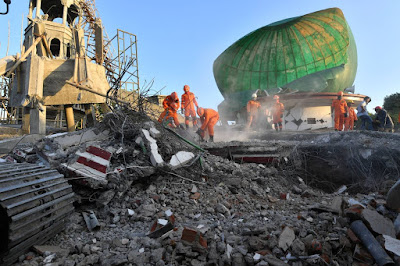The United States Geological Survey
recorded a Magnitude 6.9 Earthquake at a depth of 31 km beneath the
northern part of Lombok Island in Indonesia slightly after 7.45 pm local
time (slightly after 11.45 am GMT) on Sunday 5 August 2018. The event triggered a number of landslides and building collapses on Lombok and neighbouring islands, and is known to have killed at least 105 people, and injured more than 200 more, many of them seriously, as well as making over twenty thousand homeless. The event also destroyed a hotel in the volcanic Gili Islands, leaving over 2000 tourists without accommodation until they could be rescued, which is likely to have a lasting influence on the area's tourist industry.
Search and rescue teams in the remains of a collapsed mosque in Pemenang, North Lombok. AFP/Getty Images.
The
Indo-Australian Plate, which underlies the Indian Ocean to the south of
Java, Bali and Lombok, is being subducted beneath the Sunda Plate, a
breakaway part of the Eurasian Plate which underlies the islands and
neighbouring Sumatra, along the Sunda Trench, passing under the islands,
where friction between the two plates can cause Earthquakes. As the
Indo-Australian Plate sinks further into the Earth it is partially
melted and some of the melted material rises through the overlying Sunda
Plate as magma, fuelling the volcanoes of Java and neighbouring
islands.
Subduction along the Sunda Trench beneath Java, Bali and Lombok. Earth Observatory of Singapore.
Meanwhile,
to the north of Lombok and eastwards through the Lesser Sunda Islands,
the Eurasian Plate is also being subducted beneath the islands, creating
a separate microplate. the Timor Plate, with subduction beneath it to
both the south and the north.
Witness
accounts of Earthquakes can help geologists to understand these events,
and the structures that cause them. The international non-profit
organisation Earthquake Report is interested in hearing from people who may have felt this event; if you felt this quake then you can report it to Earthquake Report here.
See also...
Follow
Sciency Thoughts on Facebook.








